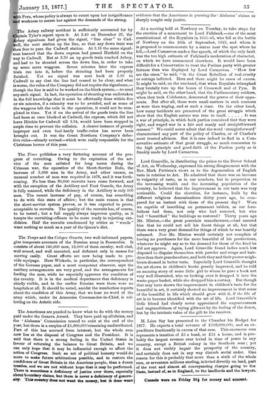Lord Granville, in distributing the prizes to the Dover School
of Art, on Wednesday, expressed his strong disagreement with the Rev. Mark Pattison's views as to the degeneration of English taste in relation to Art. He admitted that there was an increase in vulgarity of taste, as in our numbers, but in proportion to the increasing wealth and the increasing population of the country, he believed that the improvement in our taste was very noticeable. Could the churches, for instance, built by the different religious denominations thirty years ago, be com- pared for an instant with those of the present day? Were we capable of inscribing on permanent tablets, as our fore- fathers had done, not only who had restored, but who had "beautified" the buildings so restored? Thirty years ago Mr. Minton,—the great porcelain manufacturer,—had assured him that he could not sell his finest things at all, but that there was a very great demand for things of which he was heartily ashamed. Now Mr. Minton would certainly not complain of having no purchasers for the more beautiful of his productions, whatever he might say as to the demand for those of the kind he did not approve. Again, Lord Granville found ladies much less dispoied to disguise themselves with powder and rouge and hair- dyes than their grandmothers, and both they and their poorer neigh- bours dressed in better taste. Especially Lord Granville thought the art shown in children's books greatly improved, and he told an amusing story of some little girl to whom he gave a book not very well illustrated, who on looking over it dropped it into the waste-paper basket, while she dropped him a curtsey. But though that may have shown the improvement in children's taste for the beautiful in art, it certainly showed no improvement in that sense of the beautiful in life which should grow with it, if the life of art is to become identified with the art of life. Lord Granville's little friend had clearly never appreciated the ungraciousness and ungracefulness of trying gifts not by the feeling of the donor, but by the intrinsic value of the gift to the receiver.






































 Previous page
Previous page